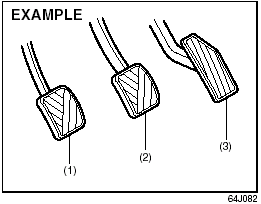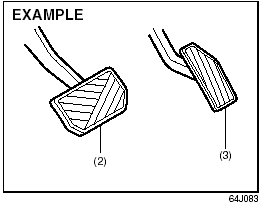Pedals

Manual transmission

Automatic transmission
Clutch Pedal (1)
(For manual transmission).
The clutch pedal is used to disengage the drive to the wheels when starting the engine, stopping or shifting the gearshift lever or transfer lever. Depressing the pedal disengages the clutch.
CAUTION:
Do not drive with your foot resting on
the clutch pedal. It could result in
excessive clutch wear or clutch damage.
Brake Pedal (2)
Your SUZUKI vehicle is equipped with front disc brakes and rear drum brakes.
Depressing the brake pedal applies both sets of brakes.
You may hear occasional brake squeal when you apply the brakes. This is a normal condition caused by environmental factors such as cold, wet, snow, etc.
 WARNING:
WARNING:
If brake squeal is excessive and
occurs each time the brakes are
applied, you should have the brakes
checked by your SUZUKI dealer.
 WARNING:
WARNING:
Do not “ride” the brakes by applying
them continuously or resting your
foot on the pedal. This will result in
overheating of the brakes which
could cause unpredictable braking
action, longer stopping distances or
permanent brake damage.
Accelerator Pedal (3)
This pedal controls the speed of the engine. Depressing the accelerator pedal increases power output and speed.
See also:
Jump Starting Instructions
WARNING:
• Never attempt to jump start your
vehicle if the battery appears to be
frozen. Batteries in this condition
may explode or rupture if jump
starting is attempted.
• When making ...
AM/FM/XM CD PLAYER WITH CD CHANGER CONTROL (Built in CD Player)
Type 1 AM/FM/XM CD PLAYER WITH CD CHANGER CONTROL (Built in CD Player)
(1) CD insertion slot
(2) CD eject button
(3) Disc button (CD/AUX)
(4) Track up button/Fast forward button
(5) Track down ...
Instrument Panel
...
